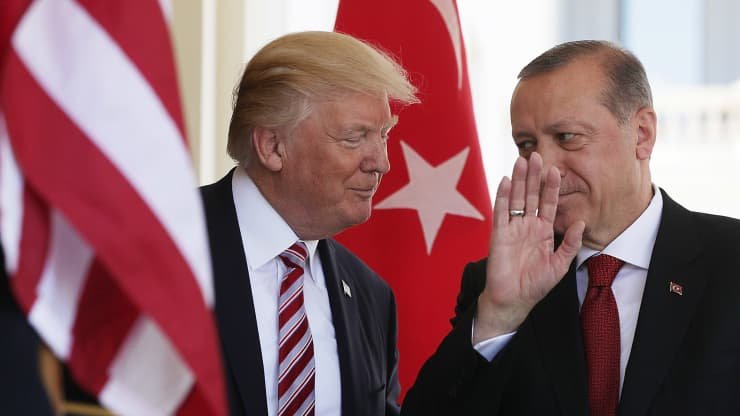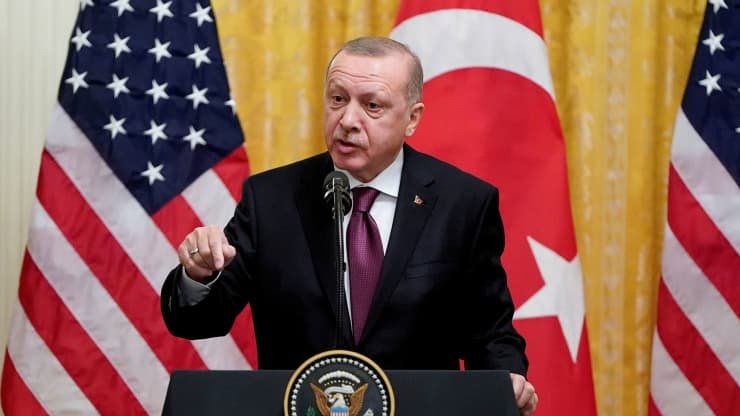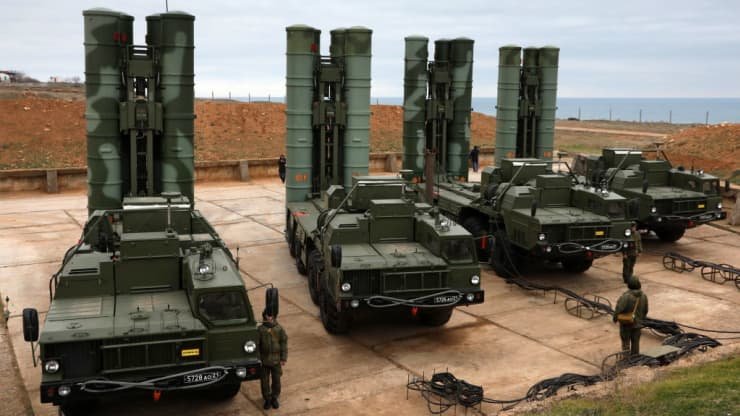
‘Erdogan should be very, very worried': What the Biden presidency means for Turkey

President Donald Trump (L) welcomes President Recep Tayyip Erdogan (R) of Turkey outside the West Wing of the White House May 16, 2017 in Washington, DC.
Tensions between the U.S. and Turkey have been mounting for a while.
But under outgoing President Donald Trump, many of the potential flashpoints between the NATO allies were smoothed over thanks to a friendly relationship between Trump and Turkish President Recep Tayyip Erdogan.
Looking ahead to a Joe Biden administration, there’s a chance that some of those tensions could blow up — but there is also chance for reconciliation. Whatever happens, the next four years for Turkey and its relationship with Washington are likely to look very different from the last four.
“The only thing holding the relationship together for the last several years has been Trump’s personal relationship with Erdogan,” Michael Rubin, a former Pentagon official and resident scholar at the American Enterprise Institute, told CNBC. “With Trump removed, Erdogan should be very, very worried.“
That’s because there is no shortage of conflict points between Ankara and Washington; points that reveal contrasting attitudes toward geopolitics, alliances and governance.

Among those are human rights in Turkey, which Democrats in particular have spoken out against; Turkey’s purchase of Russia’s S-400 missile system which angered its NATO allies and nearly triggered U.S. sanctions; and its military action against America’s Kurdish allies in northern Syria and support for Islamic extremist groups, which Ankara argues are not terrorists and are necessary to protect its interests in the region.
There are also Erdogan’s aggressive moves against Greece and Cyprus over gas resources in the Eastern Mediterranean; Turkey’s alleged role in helping Iran skirt U.S. sanctions; and the shared Incirlik air base, where Turkey hosts a huge number of American troops, aircraft and some 50 of its nuclear warheads — and which Erdogan has threatened to cut off if hit with U.S. sanctions.
So, that’s a lot. What has Biden said on some of these issues?
Biden and Erdogan name-calling
Based on his previous statements, it looks like there will be a tougher line from Washington. In an interview last January, Biden called Erdogan an “autocrat,” criticized his actions toward the Kurds and said that the Turkish leader “has to pay a price.” He also suggested the U.S. should support Turkish opposition leaders “to be able to take on and defeat Erdogan. Not by a coup, but by the electoral process.”
Biden has pledged to recognize the Armenian genocide, a hugely contentious issue for Turkey and one which U.S. presidents have avoided acknowledging for a century. Amid the turmoil of World War I, as many as 1.5 million Armenian civilians were expelled or killed by what was then the Ottoman Empire. No government of Turkey has ever acknowledged it as a genocide. Turkey and Armenia do not have diplomatic relations.
Democratic and Republican lawmakers alike have supported sanctions over both Turkey’s military assaults on the Kurds, viewed by Ankara as terrorists, and its buying and testing of the Russian S-400 missile defense system. Sanctions would be a devastating blow to Turkey’s already suffering economy.
For its part, Turkey has threatened retaliation for any sanctions, including hamstringing the Americans over the highly strategic Incirlik air base. Erdogan has previously slammed Biden for being an “interventionist.”
Still, Erdogan spokesman Ibrahim Kalin on Wednesday said Turkey believes it can have a “good and positive agenda” with a Biden administration, and called any punishment for its S-400 purchase “counterproductive.”
Between Russia and a hard place
Both the U.S. and Europe have become “increasingly frustrated” with Erdogan’s emboldened foreign interventions and “erratic” behavior toward allies and adversaries alike, said Agathe Demarais, global forecasting director at the at the Economist Intelligence Unit.
“This is a dangerous path,” she said. “The incoming Biden administration is likely to take a much tougher stance on Turkey than Donald Trump has done.”
But that comes with its own set of risks to the U.S. — namely, that punishing an ally like Turkey only pushes it further into the arms of Russia.

“The U.S. would be shooting itself in the foot... if placed under stringent U.S. sanctions, Turkey would double down on its attempts to deepen its relations with Russia and Iran,” Demarais said.
With the second-largest military in NATO and strategic access to American operations in the Middle East, Turkey is a partner many believe the U.S. can’t afford to lose to an adversary.
Possibilities for win-win outcomes?
Not everyone sees a dire future as a foregone conclusion for Washington and Ankara.
Turkey is “mega strategic” for the U.S. and Europe, stressed Timothy Ash, senior emerging markets strategist at Bluebay Asset Management. Because of this, he expects that “Biden will work overtime to try and improve relations with Turkey and bring the country back into the Western fold.”
“I think it is important to remember that the two biggest risks to the U.S. are China and Russia,” Ash said. ”‘Winning’ Turkey back from Russia would be a huge win for Biden, and I think they will focus on that.”
It’s also worth noting that the relationship during Trump’s tenure wasn’t always rosy. In August of 2018, Trump threatened sanctions on Turkey over its detention of an American pastor — a threat that sent the Turkish lira to its then-lowest level ever against the dollar and intensified its deepening economic crisis.
Now, with its currency at record lows, high inflation and unemployment exacerbated by the coronavirus pandemic, any clashes with the U.S. that risk sanctions are even more perilous for the Turkish economy.
Investors and regional analysts will be watching the Biden-Erdogan dynamic over the coming months to see whether, in the words of Turkish academic Ahmed Alioglu, “Turkey should get ready for a rocky four years ahead.”











